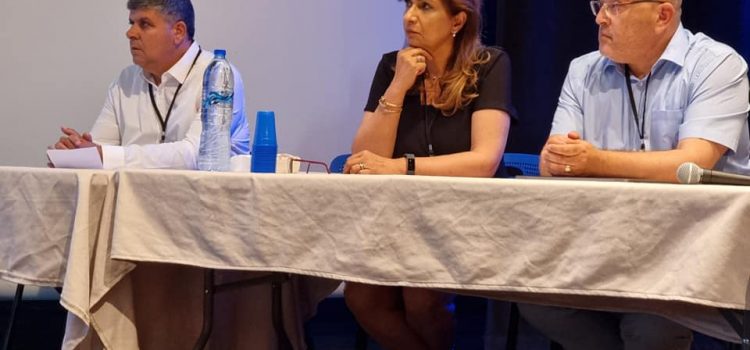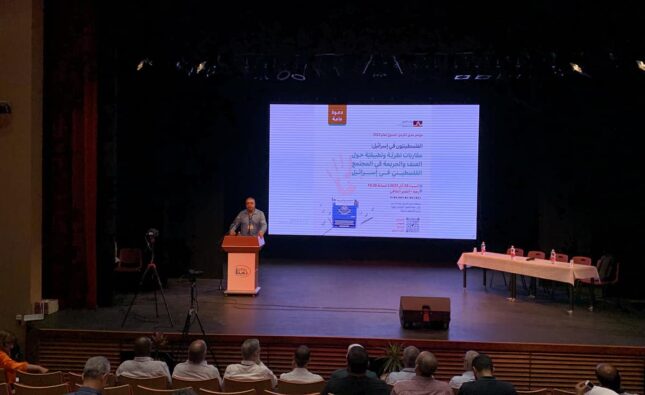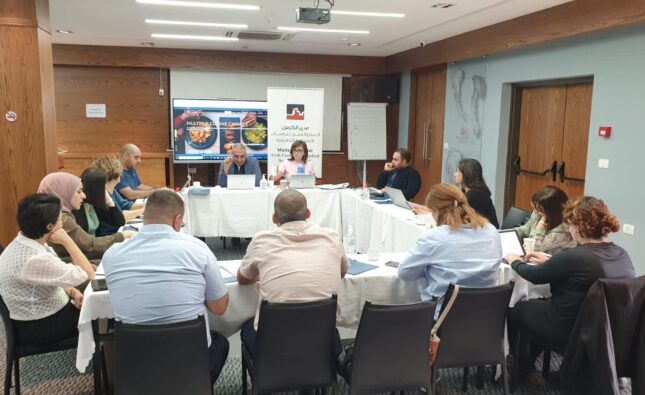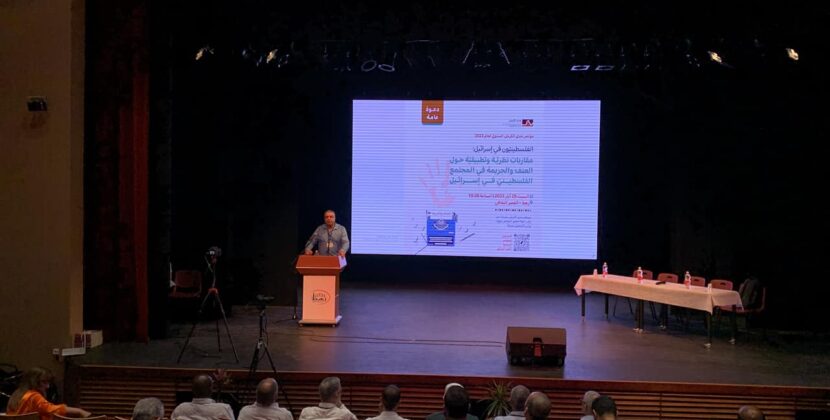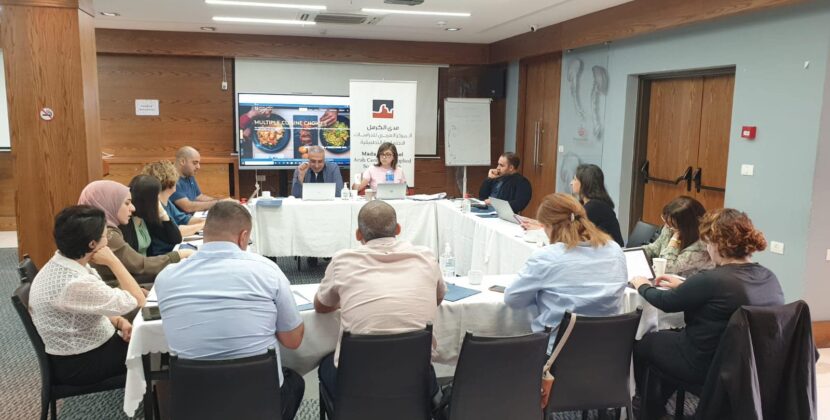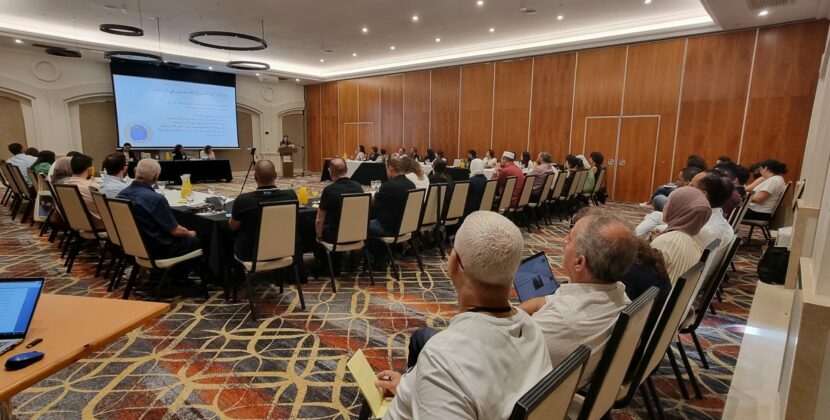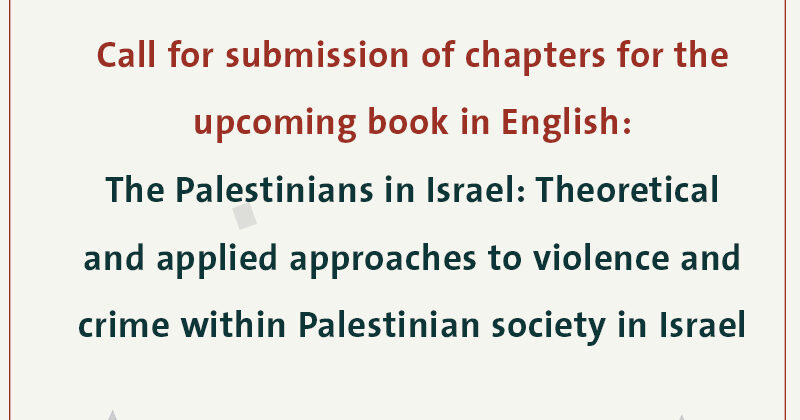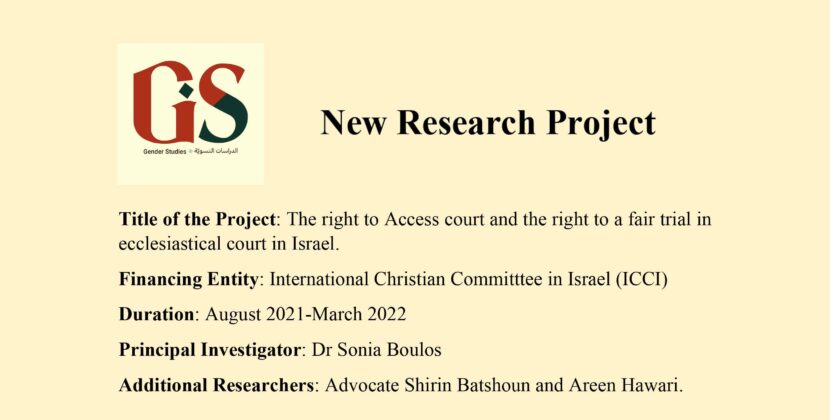Mada Al-Carmel – the Arab Center for Applied Social Research held its 2021 Annual Conference at Umm El Fahem Theatre and Cinematheque on July 31st. This year’s conference, entitled the “Political and Social Approaches between the Covid-19 Pandemic and the current uprising,” addressed and discussed the political and social implications of the current pandemic and the popular uprising on the reality, future and the challenges imposed on the Palestinian society in Israel. This conference is part of the academic activity through which Madal Al-Carmel Center seeks to generate focused knowledge on the Palestinian cause as well as showcasing the concerns of the Palestinian people. The conference showcased remarkable progress in its presentation, its knowledge approaches, its organization and its attraction of hundreds of researchers, on both the Palestinian and Arab world levels.
In his speech, Dr. Samir Subhi, Mayor of Umm Al-Fahem, welcomed the audience and and Mada Al-Carmel Center staff. He spoke from his position as a mayor, on fundamental problems that are facing the Palestinian community. Professor Nadera Shalhoub-Kevorkian, chair of the Mada Al-Carmel Board; spoke after the Mayor, where she encouraged research and editorial writing. She praised the path that Mada Al-Carmel is taking towards emancipating from the dominant theoretical formats and promoting Palestinian intellectual cognitive production that challenges and undermines the Israeli narrative. Dr. Ayman Egbarieh, lecturer at the Faculty of Education at the University of Haifa, and member of the Academic Committee of the Conference, chose to resort to art works by recalling the painting “The Triumph of Death” by the Dutch artist Peter Bruegel the Elder, to refer to the intersection between pandemics and wars, as apparent in the Palestinian reality.

Dr. Mohanad Mustafa, General-Director of Mada Al-Carmel, gave an opening speech entitled: “The Political Orientation of the Palestinians in Israel after the Uprising,” where he reviewed the results of a poll conducted by the Center to understand the causes of the popular uprising and to understand the shifts in the political stances of the Palestinians in Israel following the uprising.
The survey shows that 60% of the participants see the events of the Al-Aqsa Mosque and Sheikh Jarrah as the central factor that caused the outbreak of the uprising. According to Dr. Mustafa’s analysis, these findings reveal the centrality of Jerusalem as a religious and a political national symbol, showcasing that these political practices are similar to other practices in other parts of historic Palestine. Jerusalem is the starting point in which the popular resistance started from, as it is a meeting point of the Palestinian people holding different political perspectives, and it is the place that holds the Palestinian amputation together. Another important result of the survey is that 48% of the participants consider that the role of the Arab parties in the recent uprising was minor. Mustafa explains that this uprising arose during a weak point in the Palestinian political status in Israel, and therefore the uprising took place without the direct or the indirect influence of the Palestinian political parties. The Centre plans to publish the remaining results of the survey with an analysis in the Annual Conference report in the coming days.
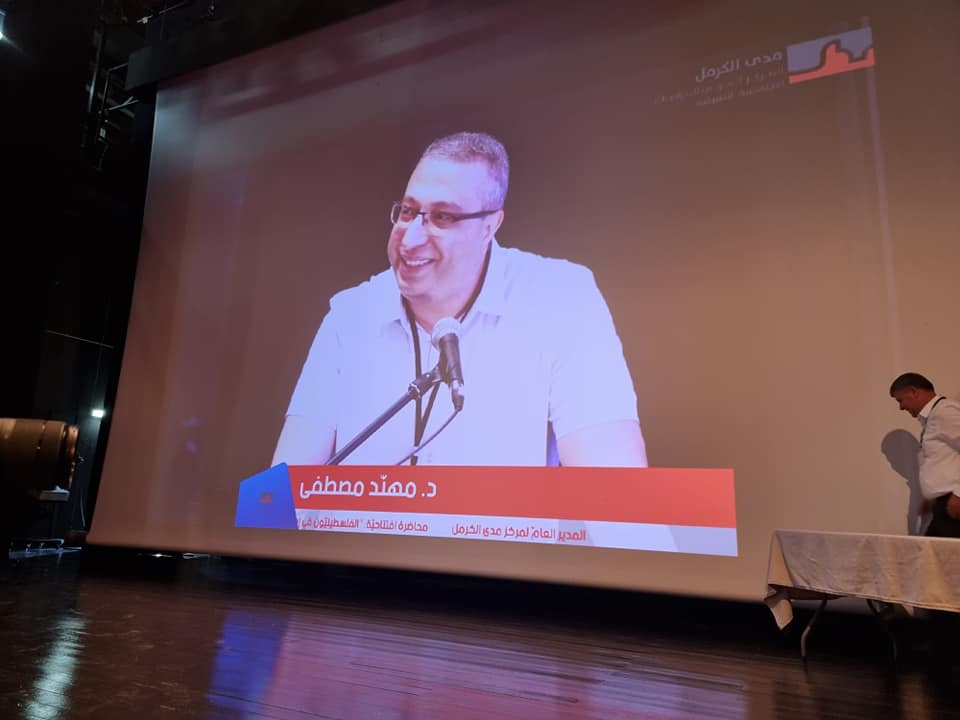
Professor Amal Jamal, lecturer and researcher in the Department of Political Science at Tel Aviv University and member of the Academic Committee of the Conference, chaired the first session entitled, “The Militarization of the Palestinian Community between the Corona Pandemic and the Current Intifada.” During the session, the representative of “Who Profits” Research Center, and political economy researcher, Hala Marshoud, presented a statement entitled “Israeli Security and Military response to the Pandemic: significance and implications”. She claimed that Israel’s settler colonial system attempts to militarize and nationalize all civil sectors. The crisis was exploited towards militarizing and nationalizing the health sector, through the intervention of military and police officers in civil matters, and through combating the pandemic using the Israeli security system and military agencies. This intervention exceeded to use intelligence units, and manufacture health and surveillance equipment by using the military knowledge in High-tech and Cyber companies, as well as the Israeli weapons manufacturing companies.
Dr. Nijmeh Ali, Research Fellow at the National Centre for Peace and Conflict Research at the University of Otago, New Zealand, shared a statement entitled “Militarized Technology for the Corona Pandemic: “Smart” Surveillance, big prison and “the Israelization of Surveillance”. Dr. Nijmeh tried through her statement to explore the impact of the application of comprehensive surveillance mechanisms, that have been used during the pandemic period, on future Palestinian behavior, linking it to a new type of weapon under technological authority, and connecting it to a new Israelization method amid militarized technology, which essentially aims at disciplining which she called the ‘Israelization of Surveillance’.
Dr. Ali set forth the most important military manifestations of the Corona Pandemic: granting new powers to deploy soldiers in public spaces, expanding the powers of Shabak (the Israel Security Agency) – legally and legislatively, sorting military medical staff in active facilities, mobilizing army intelligence teams, and employing military technology. Further, Dr. Ali touched on the surveillance methods used in the recent popular uprising: internet censorship, digital safety: facing bans, using cameras, geographic positioning, filming and self-dissemination.
The Arab Deputy Sami Abu Shehada, Knesset Member for the National Democratic Alliance within the Joint List, commentated, noting that Israeli surveillance and espionage mechanisms that exist permanently, are an axiomatic of the regime, and the normal situation there. The Deputy explained the absence of any kind of separation between the society and the army in Israel, makes the State treat the army as the only institution capable of managing any kind of crisis.
Dr. Youssef Jabarin, jurist and former Member of the Knesset for the Democratic Front for Peace and Equality within the Joint list, also offered a critique in the same session. Jabarin criticized dealing with the latest uprising by only focusing on military security methods rather than focusing on the civil methods that any democratic society has to adopt in dealing with civil and legitimate mass protests, even if these protests have taken on a national dimension.

The second session, entitled “Arab Education Amid the Corona Pandemic,” was chaired by Professor Sarab Abu Rabeea-Qwider, Lecturer at the Department of Education at Ben Gurion University, and member of the Academic Committee of the Conference. Taghreed Zubi, educational consultant and doctoral student in the Department of Education at the University of Haifa, shared a statement entitled “Arab Teachers’ Stances Towards Online Learning Amid the Corona Pandemic.” Zubi claimed that the whole teaching system was not ready for online learning, nor were teachers ready and able to teach using technology. This is particularly evident in the Arab education system, which suffers from weak technological infrastructure. In his intervention, “Arab Education in the Negev Amid the Corona Pandemic,” Khalil Dhabshah, Principal of ORT school in Kasifah town in Negev, revealed that tens of thousands of students in Negev have been dropping out of school because the vast majority of them are not ready and are not able to own the means for online learning. Students from Unrecognized Villages were the most affected by the closure of the education system, owing to the lack of infrastructure in these villages and the severe lack of any means of online learning. Further, the crisis revealed that Unrecognized villages lack any kind of services, because there are no responsible authorities or institutions formally formed to manage crises nor providing the necessary support and rationalization to thousands of families living under the Pandemic.
Mr. President Sharaf Hassan, Chairman of the Committee for Monitoring Arab Education Issues called on the civil society and Arab teachers to liberate themselves from the mental inability and to initiate, by calling for a change in the ideological and intellectual dimension of their learning process, their perception of their position and their role in challenging the difficulties caused by the Corona Pandemic. Dr. Hassan asked each teacher to see himself/herself as an intellectual and a responsible leader, not a tool for passing on materials identified only by the Ministry of Education. In the same session Nadeem Al-Masri, Chairman of the National Committee of Arab Parents of Students in Israel, stated that the Ministry of Education was not ready for any kind of emergency other than security related emergencies, and of course it wasn’t ready for the Pandemic. He also added that the Ministry of Education had dealt with the needs of Arab schools in the recent uprising through a policy of neglect, as students were not safe to travel in Arab and mixed towns. Arab schools lacked infrastructure, safe buildings, and shelters. Students were not provided with any kind of psychological or emotional support in the aftermath of the events. Almasri added that the Ministry of Education has also prevented experiencing freedom of expression, by preventing discussion about students’ identity or the current events.
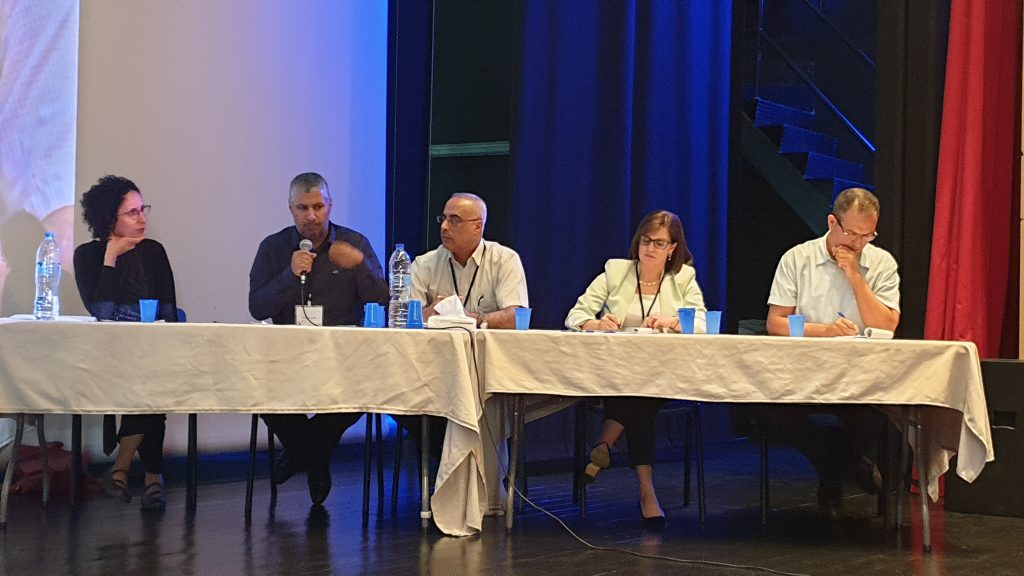
The third and final session of the Conference entitled “Social Violence and Jerusalem Amid the Corona Pandemic,” was chaired by Professor Nadera Shalhoub-Kevorkian, President of Mada Al-Carmel Board. Lubna Elenat Khalayleh, PhD student on “Educational Management” at the Arab American University-Ramallah; participated in the session with a statement entitled “Violence against Women during the Corona Crisis.” Khalayleh stated that the problem of the increasing frequency of violence against women in the Corona Pandemic had been compounded by a number of factors; the conditions imposed by the Pandemic through social isolation and domestic confinement with violent men, in conjunction with the loss of livelihoods, pressure, economic and health concerns provided fertile ground for violence against women.
Mr. Bassam Hamdan, Director of the Social Services Section of Judeide- Maker municipality, commentated saying that the phenomenon of violence against women cannot be studied in isolation from the political, economic and security context. Men’s practices of violence against women are manifestations of the hegemony and domination of Palestinians by the Israeli repressive colonial regime. He called for a change in the approach and methods of intervention, the need to recruit the Arab man and the perpetrator for treatment and the request for assistance, rather than simply settling for only raising women’s awareness of their rights. He indicated that this could be achieved through the development of a comprehensive vision starting from schools and continuing onto the remainder of the social frameworks in each country.
Reham Samana, Master’s student in Literature and Intercultural Communication at the Arab American University in Ramallah, presented her statement entitled, “The Composite Exception within the Old City of Jerusalem during the Period of the Pandemic.” Samana noted that the Occupation had increased its colonial practices during the period of the Pandemic in the Old City of Jerusalem, as crises were often a fuel for the dominant power to increase its control over vulnerable groups. These practices were demonstrated by the increasing excessive colonial violence on the citizens and their place, such as partition, isolation, demolition, issuing fines and imprisonment. Samana claims that all these and other actions were aimed at fusing people’s consciousness, causing them to be easily defeated and be convinced of the futility of the struggle resulting in accepting such reality.
In commenting on this statement, Dr. Suleiman Egbarieyh, who is responsible for the Al-Quds and Al-Aqsa file in the banned Islamic Movement in Israel, and the former Head of the Municipality of Umm Al-Fahem, stressed that the number of deportations of Palestinians from the Old City and the Al-Aqsa Mosque has been on the rise since the beginning of the Pandemic. He also noted that the shopkeepers had not had access to their shops because of the restrictions. Finally, he spoke of increasing rates of arrests and infractions during the pandemic as part of a policy of intimidation in the Old City of Jerusalem.
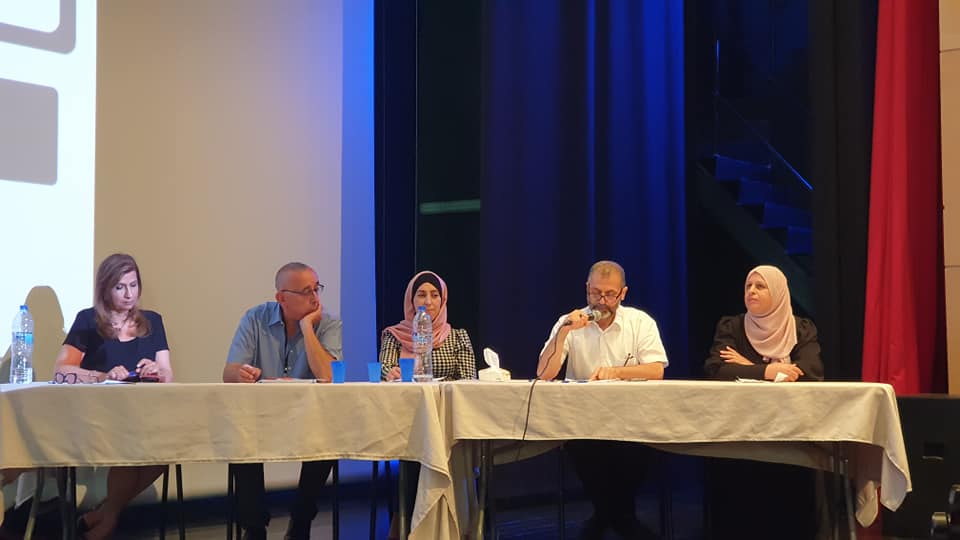
In person attendance – 100 +
To watch the opening and first sessions: Number of viewers – 2800





